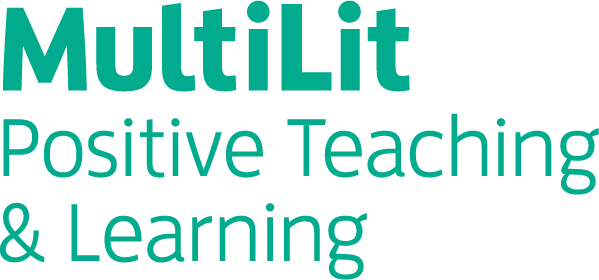Pathways for a whole-school approach
A whole-school approach to positive behaviour change ensures appropriate supports are in place at every touchpoint. This begins with ensuring the core universal strategies are firmly and consistently in place in every classroom. It also enables early screening and detection of students who may require closer monitoring, or more targeted interventions, which can then be successfully executed.
The MultiLit Positive Teaching and Learning Initiative offers a range of self-paced eLearning modules on progressively more specialised topics, organised into three Learning Series. Below are some recommended pathways through the content, depending on the needs of your school.
Foundations, Assessment and Measurement of Behaviour Learning Series
This series gives participants a deep understanding of a function-based approach to behaviour change and the training and tools necessary to implement a school-based functional behaviour assessment.
Participants will learn how to think functionally about behaviour, and support their thinking with carefully designed measurement systems. Throughout this pathway, you will receive access to downloadable templates, checklists, data sheets and graphing tools to support your implementation.
How it will benefit your students
- When teachers and schools have better insight into student behaviour, students’ social, emotional, behavioural and academic needs can be met more readily and effectively.
- A function-based approach helps people to look beyond the challenging behaviour itself and dig deeper to understand the reasons behind it. Understanding why a student engages in behaviours that challenge is the first step to thinking about strategies that directly address those reasons.
- A student may experience enhanced, positive relationships as a function-based approach will guide teachers towards proactive and positive supports before reactive and punitive ones.
- Interventions developed from the outcomes of functional behaviour assessment are proven to be more effective at reducing challenging behaviour, thus removing barriers for the student to experience success at school.
Motivation and Teaching Strategies Learning Series
This series provides participants with practical strategies to identify and teach appropriate replacement behaviour to students with challenging behaviour. Participants will learn specific behavioural teaching strategies to teach functional communication skills, social skills and other adaptive skills to students who require Tier 2 and Tier 3 level supports. Participants will learn how to harness the motivation of
their students to improve their behaviour, engagement and learning.
How it will benefit your students
- When students have the support to develop safer, more appropriate and effective ways to manage the academic and social demands of a school environment, their ability to participate, engage with the curriculum and learn drastically improves.
- Motivated students will have greater success both academically and socially and develop a positive connection between working hard and achieving.
Teaching for Positive Behaviour Change pathway
This combination provides participants with a consistent approach to the way in which they think and talk about behaviour, across all the tiers of a Response to Intervention approach, and an introduction to a school-wide function-based approach to positive behaviour support.
Participants then apply these foundational concepts of behaviour to critical positive behaviour support practices such as identifying
and teaching appropriate replacement behaviour, motivating students to engage in more appropriate behaviour and specific behavioural teaching strategies to teach students functional, safe and effective alternative behaviours at school.
How it will benefit your students
- When a whole school adopts a consistent and effective way to support the diverse learning and behavioural needs of all students, everyone benefits. Schools naturally move away from a reactive approach to a more systematic, proactive approach resulting in calmer, happier and more engaged students.
- Positive approaches that focus on teaching guide us to look for opportunities to model, teach and reinforce appropriate and desired behaviours and away from reacting to problems. This results in students experiencing success and reaping the benefits of calmer teachers who can get back to the business of teaching!



